Tense calm in far north as Israel prepares to ‘finish the job’ against Hezbollah
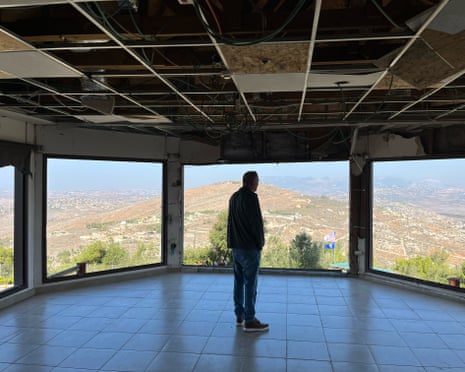
On the border with Lebanon, communities have started to return and rebuild – even though some are in no hurry to return

Noam Erlich looks out over what was his beer garden. Beyond the disordered chairs and tables and the sign instructing neighbours and friends to “pay whatever you like”, the ridge falls away to fields, then a fence, then hills littered with the skeletal ruins of shattered Lebanese villages.
The 44-year-old brewer is standing in front of the house his grandfather built when the Manara kibbutz was founded in the 1940s in the very far north of Israel. The building was hit repeatedly by missiles fired by Hezbollah during the conflict, which ended a year ago, and will now almost certainly be demolished, along with most of the neighbouring houses.
“Wars destroy things, but bring opportunities too,” Erlich said.
There is a bipartisan consensus in Israel this weekend that a fresh military offensive to “finish the job” of destroying Hezbollah’s military capabilities is imminent.
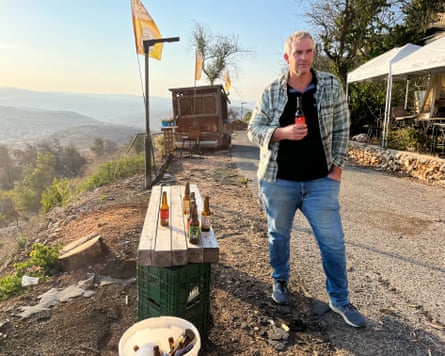
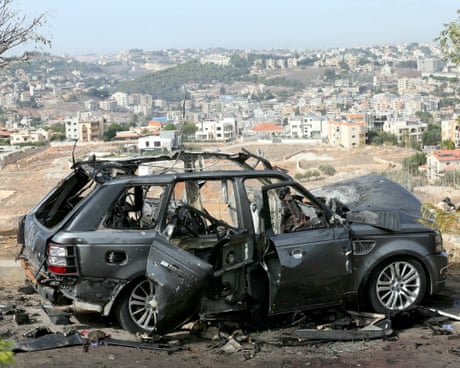
The left-leaning Haaretz newspaper told readers last week that the “immediate flash point” was “now in Lebanon, not Gaza”, while Amit Segal, a journalist close to the ruling coalition government of the prime minister, Benjamin Netanyahu, said that “a dramatic escalation against Hezbollah” was “more likely than not”.
On the border, there is a tense calm.
Israel’s air defence systems protected local communities from most of the rocket barrages launched by Hezbollah in solidarity with Hamas in Gaza, but 47 civilians in Israel and 83 Israeli soldiers died, with hundreds more wounded, and tens of thousands displaced. Israel’s major offensive in autumn last year delivered a series of devastating blows to Hezbollah but also killed an estimated 3,800 people in Lebanon, including many civilians, and forced 1.2 million from their homes. Damage was estimated at $8.5bn (£6.5bn).
Erlich, like many along the Israeli side of the border, is sanguine about the future. Though he has lost his home and the microbrewery that provided his income when forced to evacuate Manara, he switched production to large commercial breweries in central Israel and now sells ten times more.
“The war was a blessing in disguise,” he said.
Most of those Israelis who evacuated in the first days of the war have now returned to border communities, or others are taking their place.
Metula, the northernmost town in Israel, was turned into an army base during the war and 80% of its houses were damaged by missiles launched by Hezbollah from positions inside Lebanon, but just hundreds of metres away. The pre-war population was 1,670. It is now 900. In the war, “some won, some lost,” said David Azoulay, Metula’s mayor.
The town’s 130-year-old synagogue is being reconstructed, the road repaved and the town hall’s roof replaced.
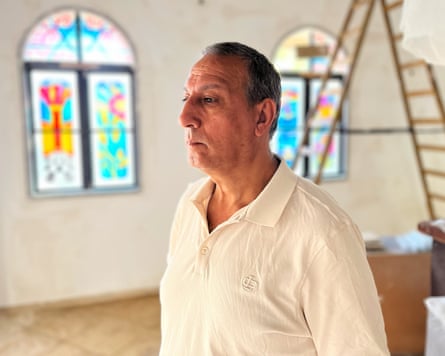
“We didn’t have funds to fix many of the buildings that needed work before the war … Now we are going to make the whole of this town way better than it was … We can build up luxury facilities, cultural opportunities, better health and childcare, build a new neighbourhood,” said Azoulay.
But it is clear that whatever the new investment in some communities along Israel’s northern border, there are some former residents who will not come back. Those with young families have children in school elsewhere in Israel, others have found new jobs, or simply enjoy the convenience and attractions of big cities such as Tel Aviv, almost 125 miles (200 kilometres) away.
Students who used to rent cheaply in Metula have stayed away too, but there has been a new influx: 40 families of nationalist and religious Israelis who see the reconstruction of Metula as a worthy cause.
“Metula will stay secular [but] we can’t tell them not to come,” said Azulai. “They are Zionists and Jews like us. Personally, I have no problem with them.”
The social consequences of the conflict are obvious in Kiryat Shmona, the “capital city” of the north, which is still missing around a quarter of its pre-war population. In a small mall on the northern outskirts, a third of shops and restaurants remain closed, and those that have reopened struggle.
“I have to work my ass off to make ends meet,” said Sergio Helman, who kept serving humus and salad in his Blue Bus cafe throughout the war, despite rocket attacks.
But Helman’s children, sent away during the conflict, have got used to life elsewhere in Israel and are in no hurry to return.
“Things are slowly getting back to normal but the war created inner conflicts within communities here. There are kids who went to three schools in two years,” said Helman.

Residents of Kiryat Shmona have long complained of being economically disadvantaged and forgotten by national politicians.
“This city is important strategically for Israel. It anchors all our defences across the north … but it’s a ghost town. If people are going to come back we need to give them confidence that we can stop the enemy reaching our children’s beds,” said Yamit Malul Yanai, a local commentator and lawyer.
Like many along Israel’s northern border, Malul Yanai frequently refers to the surprise Hamas raid into Israel in October 2023 which killed around 1,200 people, mostly civilians, and took 250 hostage, triggering the war in Gaza.
“We need a buffer zone to push the enemy back from our towns, but we are making the same mistakes all over again,” she said.
From Metula, the de facto border between Israel and Lebanon runs south and then west along across forested ridges to the Mediterranean. Known as the “blue line”, it has not been formally recognised internationally. Since the ceasefire, Israeli forces have held five hill-top bases between up to a mile and a half inside Lebanon, and are building sections of high walls. The United Nations Interim Force In Lebanon (Unifil) has said at least one is within Lebanese territory, a charge denied by Israel.
At Shtula, another Israeli border community evacuated during the war, residents have also been slow to return. A row of damaged homes faces Lebanon, many as yet unrepaired. The Israeli military has built a high concrete barrier just to the north and positioned tanks.
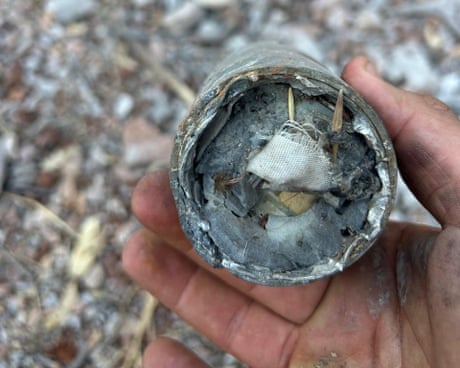
“We are fortifying the border … We want a barrier and the military between civilians and the enemy. We also have cameras, weapons systems, soldiers monitoring,” said a senior Israeli officer based close to the border. “We have learned the lessons of Gaza. We understand that the wall is part of the system, not the [whole] system, which was the mistake in Gaza.”
From an outpost near Shtula, one of the new Israeli bases inside Lebanon is clearly visible, beyond slopes cleared of forest by the military during its invasion last year. Across a swath of the dry brown hills lies the scattered rubble of destroyed houses in now-deserted villages, starkly white against under the clear blue winter sky.
“As long as [the] Lebanese army is not there, then we will have to be there,” the officer, who spoke on condition of anonymity, said.
Israel has accused Hezbollah of trying to rearm since a US-backed ceasefire last year, and has launched more than 1,000 attacks in Lebanon since the 2024 ceasefire, killing hundreds of people. Fresh Israeli airstrikes have hit targets across southern Lebanon in recent days.
Hezbollah says it has complied with ceasefire requirements for it to withdraw from the border region near Israel, and for the Lebanese army to deploy there. Hezbollah’s leader, Naim Qassem, has refrained so far from ordering the movement’s tens of thousands of fighters to launch any military response to the Israeli strikes.
Some analysts say talk of a fresh Israeli offensive may be designed to increase pressure on the Lebanese army to move more aggressively to disarm Hezbollah, but suggest it could also be intended to reinforce support for Israel’s rightwing ruling coalition.
Israeli military officials said they were “committed to the ceasefire agreement, but also to Israel’s security”.
Azoulay is unconcerned by the prospect of a new attack by Hezbollah.
“We will deal with it if it happens,” he said. “All the [Lebanese Shia] villages around us, they are destroyed and basically uninhabitable. If you ask what is our victory, it is that we have been rebuilding for a year and they haven’t put a single pipe back in the ground.”
Comments
Post a Comment